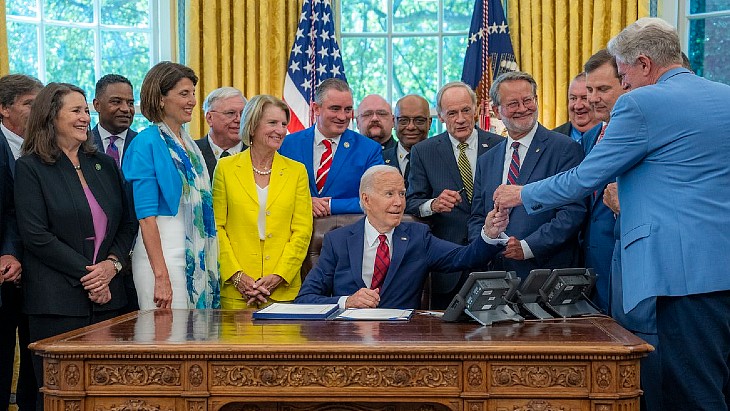Three US firms awarded Mo-99 production funds
.jpg)
The isotope technetium-99m (which is the daughter isotope of Mo-99) is used in over 40,000 procedures in the USA per day. However, for 30 years prior to 2018, the USA had not produced Mo-99 and currently imports much of its requirements. Since 2009, the NNSA has been working with commercial partners to accelerate the establishment of a domestic Mo-99 supply network. In 2018, one of those partners, NorthStar Medical Radioisotopes, received Food & Drug Administration (FDA) approval for manufacture of its domestic, non-uranium Mo-99, the RadioGenix System (technetium 99m generator) and Tc 99m produced by the RadioGenix System. With its partner MURR, NorthStar is the first domestic producer of Mo-99. Since FDA approval, NorthStar has started to supply customers, becoming the first US producer of Mo-99 in more than three decades, as well as offering a novel new approach to the generation of Tc-99m.
Congress appropriated USD40 million in fiscal year 2018 and USD20 million in FY2019 and directed the Department of Energy (DOE) to issue a funding opportunity announcement to competitively award cooperative agreements for the production of Mo-99 without the use of HEU. NNSA will fund each agreement at USD15 million and require each awardee to provide USD15 million of matching funds.
NNSA announced yesterday that it had completed negotiations for three cooperative agreement awards for the production of Mo-99 without the use of highly enriched uranium (HEU). These awards were negotiated and agreed upon with the vendors following the selection of four potential awardees in February. The following companies will now receive a cooperative agreement award: Niowave Inc, NorthStar Medical Radioisotopes LLC and Shine Medical Technologies.
Lansing, Michigan based Niowave is developing superconducting electron linear accelerators for medical radioisotope production. NorthStar - based in Beloit, Wisconsin - is developing two processes to produce Mo-99 without using HEU. In the short term, it is working to use the Missouri University Research Reactor (MURR) to irradiate Mo-98 targets to produce Mo-99, and in the longer term it is developing a method to produce the isotope using a linear accelerator. Shine is constructing a facility in Janesville, Wisconsin, which will produce medically important isotopes.
Negotiations for a fourth cooperative agreement with Northwest Medical Isotopes (NWMI), located in Corvallis, Oregon are ongoing, NNSA said. NWMI has licensed technology from Oregon State University for new low-enriched uranium (LEU) targets for use in Triga research reactors. NWMI - based in Corvallis, Oregon - has already notified the US Nuclear Regulatory Commission of its intention to submit an application for a construction licence for a facility which would produce the targets, ship them to a network of university research reactors where they would be irradiated, and process the returned irradiated targets to recover the Mo-99.
“Mo-99 is a critical medical isotope that empowers us to fight back against heart disease and cancer,” said Lisa Gordon-Hagerty, DOE under secretary for nuclear security and NNSA administrator. “These agreements will facilitate its domestic production without highly enriched uranium, greatly reducing the potential for proliferation of nuclear materials.”
Shine applies for licence
NNSA's announcement of the awards came the same day as Shine Medical Technologies submitted an application to the NRC for an operating licence for its new facility in Janesville. In addition to Mo-99, the facility will also produce other medical isotopes, including iodine-131 and xenon-133.
In 2016, Shine received regulatory approval to construct its production facility. It broke ground on the plant in May, with commercial production scheduled to begin in 2021.
“Completing our NRC operating licence application signals the transition of our efforts to establish a secure global supply of medical isotopes from the design and engineering phase to the construction and delivery phase,” said Greg Piefer, founder and CEO of Shine. “This required an extraordinary effort by our world-class team, including more than 150,000 person-hours of work. Time and time again, they have stepped up and delivered high-quality products, demonstrating Shine’s commitment to supplying lifesaving medical tracers and therapeutics to an underserved and growing global market.”
The company said the Janesville facility "will be the first of its kind in the world, utilising the company’s patented technology".
“Shine’s fusion-fission technology enables us to produce Mo-99 more safely, cleanly and efficiently than conventional reactor-based technologies,” said Piefer. “The completion of this milestone should signal to the market that Shine is on track to help end isotope shortages once the Janesville production facility, capable of producing more than one-third of global demand for Mo-99, is online.”










_88592.jpg)

